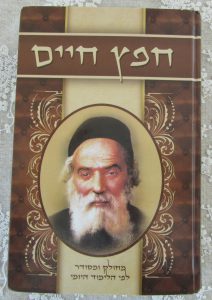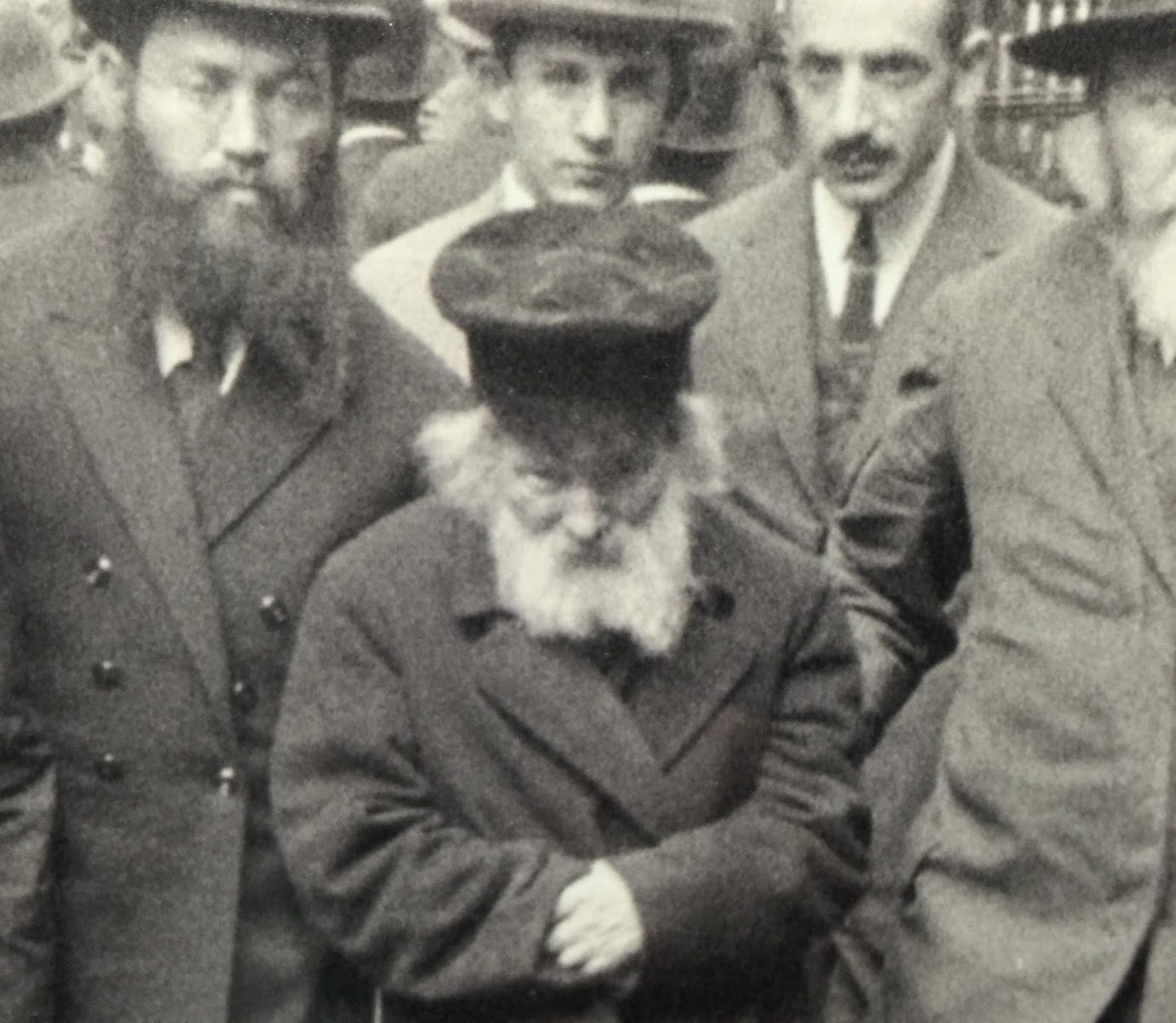These chapter summaries of Sefer Chafetz Chaim are best used as a study aid in conjunction with the sefer itself. They are obviously not a substitute to the in-depth and all encompassing work of the Chafetz Chaim.
General Summary Key
ChCh = Chafetz Chaim, LHR = Lashon Hara, BMCh = Be’er Mayim Chaim, ChB = Chelkas Binyamin (commentary on ChCh)
Summary Of Peticha – Lavin
 LHR has caused a multitude of catastrophes throughout our history, starting right back from Gan Eden. Because negative speech can cause murder, the Torah juxtaposes the law of the talebearer to the phrase לא תעמוד על דם רעך – Don’t allow your friend’s blood to be spilled.
LHR has caused a multitude of catastrophes throughout our history, starting right back from Gan Eden. Because negative speech can cause murder, the Torah juxtaposes the law of the talebearer to the phrase לא תעמוד על דם רעך – Don’t allow your friend’s blood to be spilled.
Despite the fact that many negative behaviors do not have a specific Lav in the Torah (e.g. anger, cruelty etc.) and are instead learnt out b’remez, Hashem chose to give a specific Lav for LHR/Rechilut. This is for 2 reasons:
- It causes so much damage and destruction, as said above
- LHR is an all-encompassing aveira in that when speaking LHR a person invariably transgresses a whole gamut of interpersonal sins at the same time.
In that vein, ChCh brings 17 Lavin that a person could transgress when speaking LHR or Rechilut. They do not all apply to all situations and some of them are the opinion of an individual Rishon rather than a wide consensus of Rishonim.
There are 8 variables which will apply to some Lavin and not to others. ChCh details in each Lav which variables do/don’t apply.
8 Variables Key:
LHR = Lashon Hara, R = Rechilut, E = Emet, Sh = Sheker, F = B’Fanav. LF = Shelo B’Fanav, S = Speaker, L = Listener
Lavin
1) (לא תלך רכיל בעמיך (ויקרא יט’ טז – Do Not Be A Talebearer
LHR, R, E, Sh, F, LF, S
Sheker is included in this Lav and has its very own name – Motzi Shem Ra
2) (לא תשא שמע שוא (שמות כג’ א – Do Not Accept A False Report
LHR, R, E, Sh, F, LF, S, L (All 8)
Speaker as well, as can be read לא תשיא (Do not cause to accept).
Even though it says ‘Shav – False’, it still applies to emet, either because from the listener’s perspective – as he is not allowed to believe it, he must view it as sheker, or because practically it is impossible that there will not be a tiny amount of sheker mixed into his story, especially when person being spoken about is not around to contradict (BMCh).
3) (השמר בנגע הצרעת (דברים כד’ ח – Guard Against Getting Tzara’at (as a result of speaking LHR)
LHR, R, E, Sh, F, LF, S
ChCh not sure about the L as unsure if L gets Tzaraat
4) (לפני עור לא תתן מכשול (ויקרא יט’ יד – Don’t Place Stumbling Block Before The Blind (by facilitating others to sin)
LHR, R, E, Sh, F, LF, S, L (All 8)
The S transgresses again for every listener. However at times L may not transgress this – if he is not the only one listening nor was the only one listening at the beginning before others came (although in BMCh, ChCh says he is unsure about this and possibly even in these situations the L would transgress this Lav).
השמר לך פן תשכח את ה’ אלקיך (דברים ח’ יא) (5 – Don’t Forget Hashem (by being haughty)
LHR, E, Sh, F, LF, S
Speaking in a derogatory way about someone shows that you hold yourself to be better than him i.e. haughtiness (and if he gets personal honor from saying the comment it is even worse)
לא תחללו את שם קדשי (ויקרא כב’ לב) (6 – Don’t Desecrate My Holy Name
Transgressed when no physical pleasure results from the sin – implying that it was done in a spirit of rebellion rather than due to overbearing desire. (Furthermore, LHR is a unique mitzva in that if you were to see someone doing an aveira by mistake and point it out to them, they would stop, but with LHR they would often deny it, or deny that it was forbidden in this situation and start saying yet more LHR about the person! This is a true chillul Hashem – BMCh)
LHR, R, E, Sh, F, LF, S, L (All 8)
Worse if he is an important person in Torah (Ben Torah/Talmid Chacham). Worse if in public – (in front of 10 people – ChB)
7) (לא תשנא את אחיך בלבבך (ויקרא יט’ יז – Don’t Hate Your Brother In Your Heart
LHR, R, E, Sh, LF, S
Transgressed if he is friendly to the person in his presence but speaks negatively about him behind his back, especially if he warns the listeners not to tell the person what he said about him.
8) (לא תטור (ויקרא יט’ יח – Do Not Bear A Grudge
LHR, R, E, Sh, F, LF, S
If spoken out of revenge (see next Lav with regards to the listener). In reality, bearing a grudge is transgressed even without an action, however the action of speaking LHR shows that he bears a grudge.
9) (לא תקום (ויקרא יט’ יח – Do Not Take Revenge
LHR, R, E, Sh, F, LF, S
If spoken out of revenge. L will also transgress 8 and 9 if he helps with the story and enjoys it out of revenge. (ChB suggests that L only needs to help in order to transgress 9, but will automatically transgress 8 if he enjoys what he is hearing.)
10) (לא יקום עד אחד באיש (דברים יט’ טו – Do Not Testify As A Single Witness
LHR, R, E, Sh, F, S
If testifies about a person in Beit Din as a single witness, since Beit Din cannot do anything based on such a testimony he transgresses both LHR and being ‘a single witness’. (Since testimony can only be heard in front of the Baal Din, it therefore practically can only be F – BMCh)
11) (לא תהיה אחרי רבים לרעות (שמות כג’ ב – Don’t Follow The Masses To Do Evil
LHR, R, E, Sh, F, LF, S, L (All 8)
If joining a group of LHR speakers (Baalei LHR)
12) (לא יהיה כקרח וכעדתו (במדבר יז’ ה – Don’t Be Like Korach And His Cohorts (not allowed to strengthen/perpetuate a Machloket)
LHR, R, E, Sh, F, LF, S
If perpetuating a machloket. The L may also transgress this as well as he could have made a face that he wasn’t interested which may have stopped the argument from continuing – BMCh.
13) (לא תונו איש את עמיתו (ויקרא כה’ יז – Don’t Cause Another Distress With Words
LHR, R, E, Sh, F, S
If he says it in the person’s presence and the words cause him distress. If there are other people present it is worse as it will cause him more distress.
14) (לא תשא עליו חטא (ויקרא יט’ יז – (even when legitimately rebuking someone…) Don’t Do It In The Wrong Way And Embarrass Them
It is wrong to embarrass someone even when doing something right like educating them. Therefore it is definitely wrong to embarrass someone for no positive reason!
LHR, R, E, Sh, F, S
If he says it in the person’s presence and the words embarrass him. If there are other people present it is worse as it will cause him more embarrassment.
15) (כל אלמנה ויתום לא תענון (שמות כב’ כא – Don’t Cause Pain To A Widow Or Orphan
If the person he is speaking about (and in their presence) is a widow or orphan and it causes them distress. This applies even if they are wealthy. Some say it also applies to anyone who is downtrodden.
LHR, R, E, Sh, F, S
16) (לא תחניפו את הארץ (במדבר לה’ לג – Don’t Flatter/Honor The Undeserving (often done as an attempt to get close to them)
If saying the LHR to ‘suck up’ to the listener who he knows dislikes the person he is speaking about
LHR, R, E, Sh, F, LF, S
The L will also transgress if adds a few words showing he agrees to the speaker.
17) (לא תקלל חרש (ויקרא יט’ יד – Do Not Curse Anyone (even a deaf person who cannot hear you)
If he curses the person at the same time
LHR, R, E, Sh, F, LF, S
ChCh concludes by pointing out that these 17 Lavin can apply when a Yehudi is speaking to a Yehudi, but if reporting to an Aino Yehudi, there is the other serious issue of Mesira which he will sometimes transgress.
לע’נ הרב יוסף אליהו בן הרב מנחם יעקב


